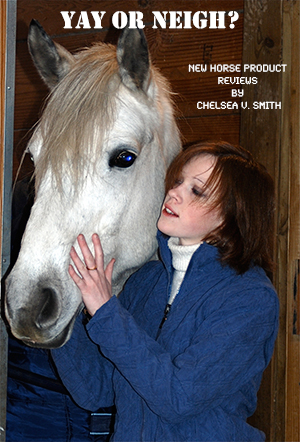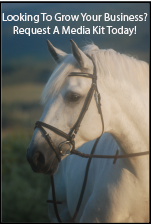Manage Your Winter Horse Care And Training Like A Pro
with Nikki Alvin-Smith
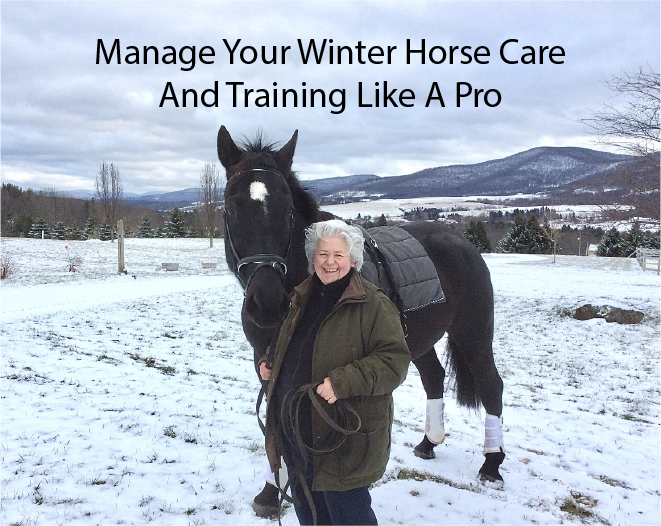
If you are a professional horse trainer and operate an equine facility located in colder climes then likely you will see an influx of winter boarders seeking livery in the Fall months. Combined with your own increase in horses arriving for training or returning from the competition circuit, training time will soon ramp up and along with all that comes the nuisance (though beauty) of snow and cold weather.
Running a horse facility isn’t easy work. The best ways to make your winter season productive and keep everyone both horse and human happy, begins and ends with being well prepared. Here are some tips, ‘pro to pro’ to ‘make a go’ of the forthcoming season.
The Dual Barn Set Up
If you are lucky enough to have developed or acquired access to a horse property with more than one stabling unit, then a smart move is to set your private yard up separately from the lesson or boarding horses. The operation of a dual barn set up means double the fun and double the pleasure. Why? Here are a myriad of reasons – and if you are in the process of building a new horse facility then consider them all, because they make the world of difference in so many ways.
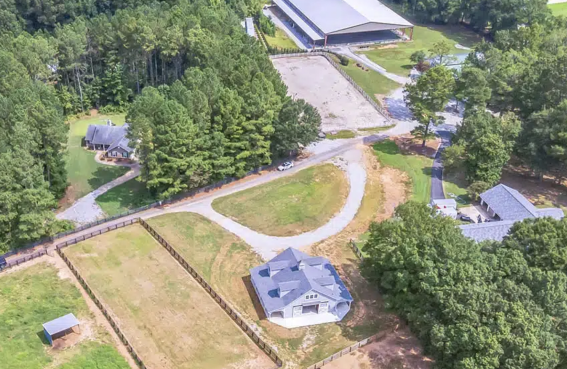
Even if you don’t have a dual barn set up available, it doesn’t mean you can’t fine tune your present stall and barn set up to make better sense for daily operation – efficient use of time and space makes life kinder on the horses and their owners/riders. So give the link above a read – because you can probably make useful changes quite simply and take advantage of the benefits.
The ultimate useful way to manage a horse barn, especially during inclement weather, is the modern day Barnodminium. What other option can assure having staff (or yourself) on hand- right on site, to handle all eventualities without waiting for the snow plow to come clear the driveway.
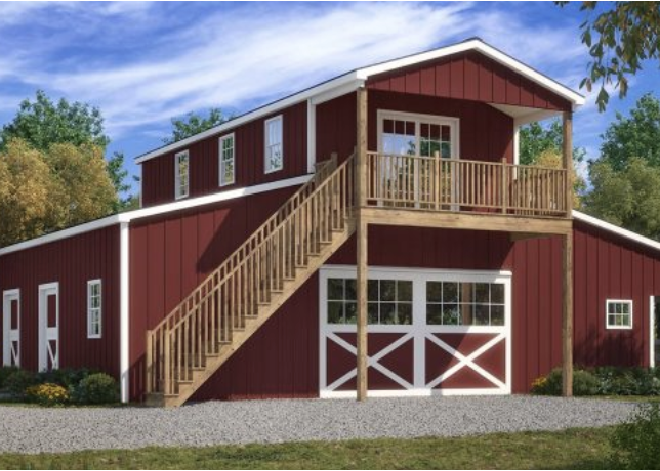
Minimize Disruptions
The winter season offers a breathing space for professional trainers and the horses in their care, sometimes by simply turning young horses away for a few months that have been gently started and need some more time to mature before more intensive work begins. Sometimes because being home and off the circuit for a bit offers a welcome relief from the stress of always being on the road and moving from place to place. And for some trainers that have a fixed abode the summer season of haymaking, mowing and property maintenance has stopped/slowed down.
While the suspension of some activities is appreciated, the business of horse training and management must go on. And the arrival of new horses and their owners, can bring much distraction to usual routines. The indoor arena suddenly becomes as busy as Penn Station on a Friday evening, and a variety of issues kick up that require supervision, troubleshooting and valuable time to remedy.
Here are some key methods to minimize the distractions, aside from those mentioned here that can help defray the intrusions:
· Set aside the earliest part of your day to school and train your privately held or clients’ horses. This way if your day goes sideways at least your training time won’t be lost.
· Set clear schedules for feeding/turnout switches and enforce them. All horses need a respite from constant interruption to their down time in a high traffic barn, especially at feeding times.
· Employ extra help in the form of casual labor to take care of winter tasks. For example paths and entranceways that require hand shoveling.
· Post barn rules especially opening hours and stick to them.
· Assign indoor arena availability hours for general use versus lesson or schooling times.
· Have a space where boarders can purchase extra hay/bedding supplies separate to your main supply. This way the variant needs that individual owners may prefer over and above what you supply on a regular basis for their horses can be met without fuss.
· Have a specific time set for longing, leading or ground-working horses versus riding times in the indoor. This can help avoid injuries and upsets often caused by mixing horses under saddle with those on the line.
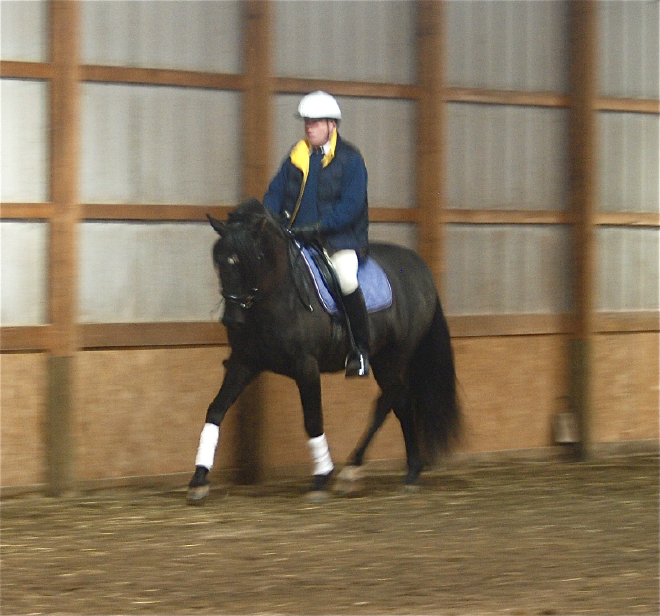
Winter Horse Care
Aside from the obvious preparations like stocking hay and bedding supplies; upgrading the indoor footing before heavy winter use; putting away equipment and tools in winter storage; clipping performance horses that will be in work; pulling out winter blankets etc., horses will also require longer warm up and cool down times.
Handling this properly will necessarily entail more time spent walking the horse at the start and end of the schooling time or lesson. This can be accomplished quite happily by following a few simple protocols:
· Overlap lessons for students by 10 minutes on each end – another advantage is the horse that is fresh and excitable will be calmer with the somewhat tired horse that is finished with work. Be aware that on leaving the arena the horse left behind may become fractious so plan the schedule accordingly with who arrives when.
· Divide a large arena with a safe barrier such as poles set atop hay bales at one end of the arena for mounting/dismounting and warm up/cool downs.
· Provide an outdoor space that is peaceful and away from problematic distractions like horses turned out or vehicles on the move, such as a maintained track at the back of the building where a horse can be cooled down outside when weather permits.
· Allocation of one or two ‘transitional’ stables within the barn for boarders that don’t have full-service leases and only have partial or rough board, can be useful to allow their horses the time needed to cool down after work before being exposed to cold temperatures or poor weather outside.
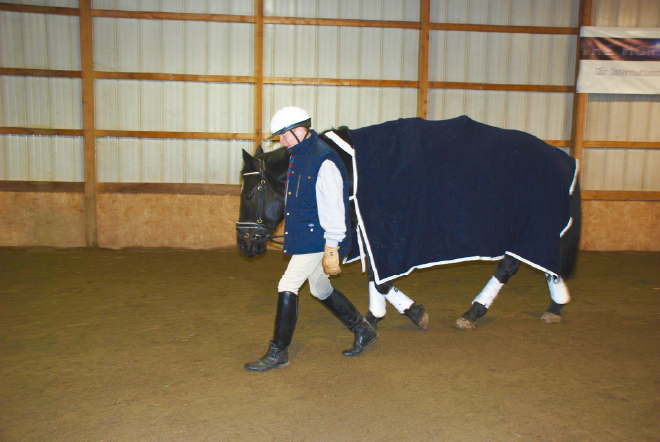
Other aspects of winter care such as the use of quarter sheets or rain sheets, coolers etc. and loosening the girth after dismounting and removing the saddle after several minutes versus right away, are all well-known facets of horse care. Water obviously should be readily available. A hot horse should never be put away in his stall hot, but in certain circumstances it may be necessary. Ensure horses are always appropriately sheeted with an anti-sweat sheet and layer system and groom off any sweat marks once dry.
Winter Rider Care
Riders also need to address cold weather temperature issues. A few notes:
· Riding attire should be easily removal in layers so the rider can remove and add clothes as necessary to maintain optimal body temperature.
· Heated riding vests, gloves and footwear offer significant comfort advantages but assure that stirrup irons properly accommodate larger profile boots.
· Despite the weather being cold, dehydration is always a factor so have water available and a warm space for recovery such as a heated tack room or office space.
· Consume a source of carbohydrates before riding. The body has to work harder to digest carbs and this builds heat (thermogenesis) and complex carbs sustain the body for longer periods than other foods.
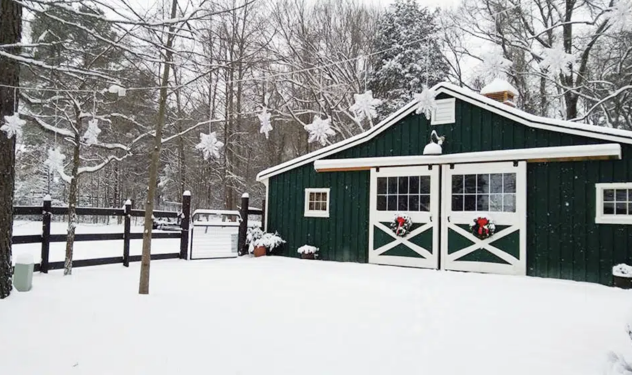
Headed To The Goldfish Bowl?
If you are headed to Florida or similarly warmer location and adventures, then prepping to leave will involve much work too. Try these hacks:
· If you have an indoor bring the trailer inside to load with supplies and horses.
· Clip your horses a few weeks before travel to give them time to adjust, not last minute.
· Up the postbiotics and prebiotics in your horses’ diets to help protect them from the stressors of long-distance travel.
· Get extra numbers for snow plow back up just in case your regular crew gets too busy.
· Check all the batteries for freshness, including those on smoke detectors and carbon monoxide that are on a Wifi system, and also interior/exterior security devices/cameras. Even solar powered ones may not work 24/7 in cold weather.
· Install detectors that notify you of water/flooding and electrical outages/overheating.
· Shut all barn blinds/windows etc. and check security of less obvious places such as hay barn doors etc.
· Remove and empty all traps that may be set for vermin. No-one wants to come back to find ‘remains’ of remains.
· Switch off the icemaker in the fridge in case it fails.
· Make sure your generator if you have one is serviced and fueled up. An easy one to forget.
On a personal note I have experienced professional horse life both ways – heading South to keep horses competing and schooled to residing year-round on our farm in the beautiful Catskill Mountains of New York. Yes, snow falls regularly during winter months here and there is always snow to be navigated.
But I love the winter season.
The tranquility. The keen brisk air. The beauty of those snowflakes and ice crystals across the mountain and through the valley. And the stuck latches on gates, the glove in mouth technique to fiddle with bridle straps and girths. The smell of warm horse and warm leather. The endless horse boot laundry and blanket swaps, and dressing up the best dolly of all, my horse. Picking hooves at the barn entrance while the horse dances above ground, anxious to come in. And best of all, that unmistakable flood of contentment that pervades your soul when your horses are all safely tucked in their PJs, munching contentedly on properly cured hay while the snow swirls around the barn.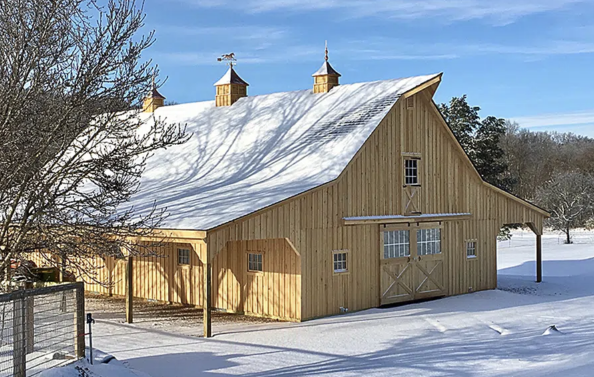
Article Courtesy of Horizon Structures LLC.
About Horizon Structures: One horse or twenty, there's one thing all horse owners have in common...the need to provide safe and secure shelter for their equine partners. At Horizon Structures, we combine expert craftsmanship, top-of-the-line materials and smart "horse-friendly" design to create a full line of sheds and barns that any horse owner can feel confident is the right choice for their horses' stabling needs.
All wood. Amish Made. Most of our buildings are shipped 100% pre-built and ready for same-day use. Larger barns are a modular construction and can be ready for your horses in less than a week. All our barn packages include everything you need -
Horizon Structures also sells chicken coops, equine hay feeders, greenhouses, dog kennels, 1 and 2 car garages, storage sheds and outdoor living structures and playsets.
Headquartered in South-Central Pennsylvania, Horizon Structures, LLC is owned by Dave Zook. Dave was raised in the Amish tradition and grew up working in the family-owned shed business. He started Horizon Structures in 2001 in response to an ever-increasing customer demand for high quality, affordable horse barns.
For additional information about the company or their product line, please visit their website at https://www.horizonstructures.com

